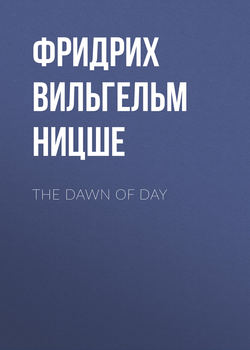Читать книгу The Dawn of Day - Фридрих Вильгельм Ницше - Страница 79
Book I
77
ОглавлениеThe Tortures of the Soul. – The whole world raises a shout of horror at the present day if one man presumes to torture the body of another: the indignation against such a being bursts forth almost spontaneously. Nay; we tremble even at the very thought of torture being inflicted on a man or an animal, and we undergo unspeakable misery when we hear of such an act having been accomplished. But the same feeling is experienced in a very much lesser degree and extent when it is a question of the tortures of the soul and the dreadfulness of their infliction. Christianity has introduced such tortures on an unprecedented scale, and still continues to preach this kind of martyrdom – yea, it even complains innocently of backsliding and indifference when it meets with a state of soul which is free from such agonies. From all this it now results that humanity, in the face of spiritual racks, tortures of the mind, and instruments of punishment, behaves even to-day with the same awesome patience and indecision which it exhibited in former times in the presence of the cruelties practised on the bodies of men or animals. Hell has certainly not remained merely an empty sound; and a new kind of pity has been devised to correspond to the newly-created fears of hell – a horrible and ponderous compassion, hitherto unknown; with people “irrevocably condemned to hell,” as, for example, the Stony Guest gave Don Juan to understand, and which, during the Christian era, should often have made the very stones weep.
Plutarch presents us with a gloomy picture of the state of mind of a superstitious man in pagan times: but this picture pales when compared with that of a Christian of the Middle Ages, who supposes that nothing can save him from “torments everlasting.” Dreadful omens appear to him: perhaps he sees a stork holding a snake in his beak and hesitating to swallow it. Or all nature suddenly becomes pale; or bright, fiery colours appear across the surface of the earth. Or the ghosts of his dead relations approach him, with features showing traces of dreadful sufferings. Or the dark walls of the room in which the man is sleeping are suddenly lighted up, and there, amidst a yellow flame, he perceives instruments of torture and a motley horde of snakes and devils. Christianity has surely turned this world of ours into a fearful habitation by raising the crucifix in all parts and thereby proclaiming the earth to be a place “where the just man is tortured to death!” And when the ardour of some great preacher for once disclosed to the public the secret sufferings of the individual, the agonies of the lonely souls, when, for example, Whitefield preached “like a dying man to the dying,” now bitterly weeping, now violently stamping his feet, speaking passionately, in abrupt and incisive tones, without fearing to turn the whole force of his attack upon any one individual present, excluding him from the assembly with excessive harshness – then indeed did it seem as if the earth were being transformed into a “field of evil.” The huge crowds were then seen to act as if seized with a sudden attack of madness: many were in fits of anguish; others lay unconscious and motionless; others, again, trembled or rent the air with their piercing shrieks. Everywhere there was a loud breathing, as of half-choked people who were gasping for the breath of life. “Indeed,” said an eye-witness once, “almost all the noises appeared to come from people who were dying in the bitterest agony.”
Let us never forget that it was Christianity which first turned the death-bed into a bed of agony, and that, by the scenes which took place there, and the terrifying sounds which were made possible there for the first time, it has poisoned the senses and the blood of innumerable witnesses and their children. Imagine the ordinary man who can never efface the recollection of words like these: “Oh, eternity! Would that I had no soul! Would that I had never been born! My soul is damned, damned; lost for ever! Six days ago you might have helped me. But now all is over. I belong to the devil, and with him I will go down to hell. Break, break, ye poor hearts of stone! Ye will not break? What more can be done for hearts of stone? I am damned that ye may be saved! There he is! Yea; there he is! Come, good devil! Come!”
